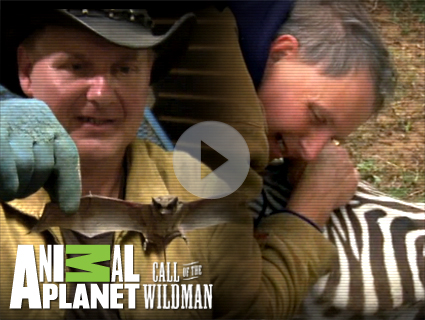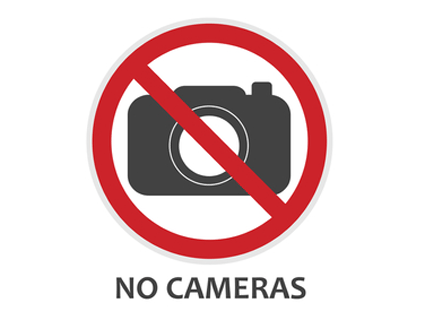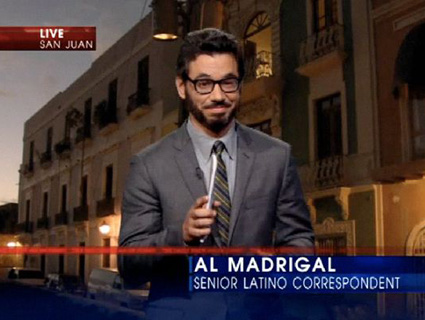This morning, I appeared on CNN’s New Day to discuss my investigation into Animal Planet’s hit reality TV show, Call of the Wildman. (Watch the interview above). My story detailed a cavalier culture of animal treatment on the set of the show, produced by New York’s Sharp Entertainment, including the improper drugging of a zebra and the placement of bats—a protected species in Texas—inside a Houston hair salon to be “rescued” by the show’s star, Ernie Brown Jr., a.k.a. Turtleman. Dan Adler, a senior vice president with the production company, represented the program for the first time in public since the story broke on Tuesday.
Most notable was Adler’s insistence that nothing whatsoever occurred on COTWM sets that could be described as improper: “The idea that there is a culture of neglect or abuse on the show is completely false,” he said. “So many shows out there kill animals for sport or for money. This show is about saving them.” Adler also said that Sharp’s own internal investigation, prompted by a former staffer last May, failed to find anything questionable with production practices.
But at the same time, new evidence is emerging of another case involving legally dubious production activities. In a letter sent in August 2013, Kentucky wildlife officials warned Brown that he was breaking the law.
The letter, made available to Mother Jones, was sent by legal counsel for the Kentucky Department of Fish and Wildlife Resources, after officials saw footage of Turtleman catching a deer in a consignment store on YouTube—despite the fact that that’s against Kentucky law, according to department spokesman Mark Marraccini.
Addressed to Ernie Brown Jr., the letter states that, “Our regulation…prohibits a NWCO [Nuisance Wildlife Control Operator] from taking white-tailed deer unless specifically authorized by the Commissioner.” The letter also says Turtleman’s actions breached another state law governing animal welfare, which entails the risk of “criminal citation.”
Also, state law…makes it illegal for any person to take, pursue, or attempt to take or pursue, or otherwise molest an elk, deer, wild turkey, or bear in a manner contrary to the Department’s regulations. Such action may result in the revocation of your NWCO permit…for a minimum of three years and/or a criminal citation.
Mother Jones has filed an open records request with the department to see responses from Turtleman, Sharp Entertainment, or Animal Planet to the department’s letter. We have also approached producers for comment on the incident, with no response. Sharp has previously told Mother Jones that all animals were handled legally by licensed wildlife personnel while on set.
The deer episode questioned by Kentucky officials involves a buck laying waste to a store, where it has somehow become stranded. Turtleman and his team attempt to corner and chase the deer, and then tackle it to the ground by its antlers, but not before havoc breaks out and crockery crashes to the floor:
Kentucky Department of Fish and Wildlife Resources’ Marraccini says officials are “looking into” other cases outlined in the Mother Jones‘ investigation that occurred in Kentucky, including a wallaby whose owner transported it across state lines from Ohio without the proper permits, and a baby raccoon that died after the filming of an episode.
Turtleman has long been on the Kentucky department’s radar. “We’ve known Ernie a long time,” says Marraccini. “And sometimes you have to send him a letter.”
Meanwhile, federal officials at the United States Department of Agriculture have told Mother Jones that they will open an inquiry into the cases outlined in our investigation. The Animal and Plant Health Inspection Service, the agency tasked with administering the Animal Welfare Act, will formally initiate a “complaint” procedure within the agency to learn more about the specific cases. “Based on the information provided in the article, we will be looking into this to determine whether the activities conducted require an AWA license,” said public affairs representative Tanya Espinosa.
Many groups that work with animals—for example, animal research facilities and parks that display animals to the public—must be licensed or registered by the USDA. Jason Clay, the owner of the drugged zebra used during filming an episode for Call of the Wildman, for example, is licensed under the federal regulations for “animal exhibitors,” which specify that “drugs, such as tranquilizers, shall not be used to facilitate, allow, or provide for public handling of the animals,” and that handling of animals should not cause trauma, behavioral stress, physical harm, or unnecessary discomfort.
Espinosa says it’s unclear how long this preliminary step might take after the complaint has been filed. Complaints like this are usually conducted to determine whether or not the department will proceed to a more formal investigation.
In a statement, Nicole Paquette, vice president of wildlife protection for the Humane Society of the United States, wrote: “We are thankful to Mother Jones for opening up people’s eyes to a form of animal exploitation that few would ever think about when watching one of these reality TV shows. We hope that networks that air reality shows like Call of the Wildman reconsider including these type of staged shows that place animals in harm’s way and we encourage the state of Kentucky to investigate and revoke Ernie Brown’s nuisance wildlife control operators permit.”
An online petition urging producers to change their practices now has more than 24,000 signatures. Viewers have also been sounding off on Animal Planet’s Facebook page, where one typical comment reads: “Dear animal planet, I will no longer watch your station. The staged Wildman shows, the neglect of animals on this so called reality show…All play into my decision of not watching your station.”









